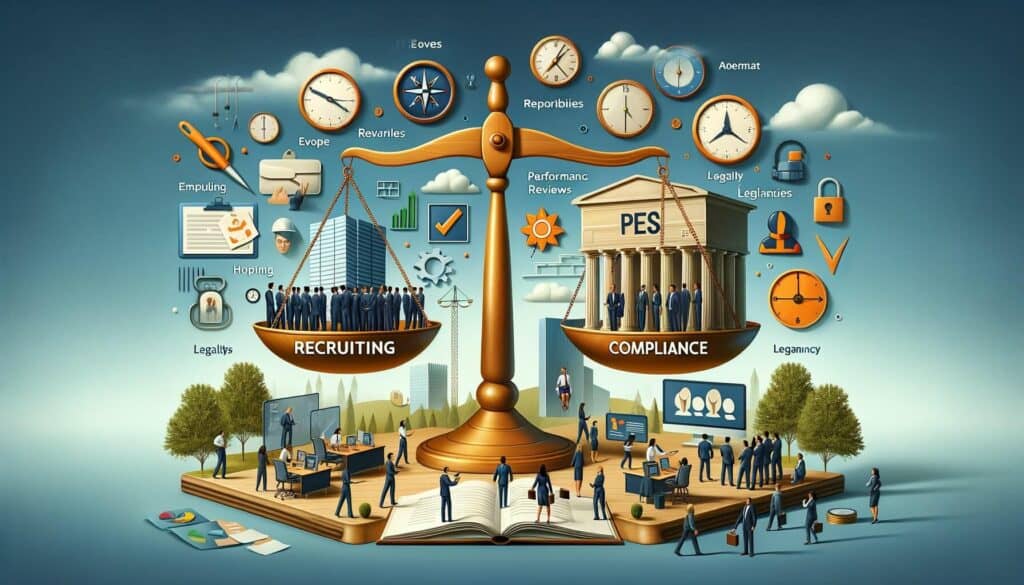
By Harriet Forster January 18, 2025
A Professional Employer Organization (PEO) is a strategic business partner that provides comprehensive HR solutions for small and medium-sized businesses (SMBs). By outsourcing their HR functions to a PEO, companies can focus on their core competencies and leave the complexities of HR management to the experts. PEOs offer a wide range of services, including payroll administration, employee benefits, risk management, and recruitment assistance.
In this article, we will delve into the role and functions of a PEO, the benefits of partnering with one, and how PEOs help with HR management and compliance.
Understanding the Role and Functions of a PEO
At its core, a PEO acts as a co-employer for its client companies. This means that the PEO (Professional Employer Organization) shares employer responsibilities with the client, including payroll, taxes, and HR compliance. By entering into a co-employment relationship, the PEO assumes these administrative burdens, allowing the client to focus on their business operations. The PEO (Professional Employer Organization) becomes the employer of record for tax and insurance purposes, while the client retains control over day-to-day operations and decision-making.
One of the key functions of a PEO (Professional Employer Organization) is to provide HR expertise and guidance to its client companies. PEOs have a team of HR professionals who stay up-to-date with the latest employment laws and regulations. They assist clients in navigating complex HR issues, such as employee relations, performance management, and disciplinary actions. By leveraging the expertise of a PEO (Professional Employer Organization), businesses can ensure compliance with labor laws and minimize the risk of legal disputes.
Benefits of Partnering with a PEO (Professional Employer Organization) for Businesses

Partnering with a PEO (Professional Employer Organization) offers numerous benefits for businesses of all sizes. Firstly, it allows companies to access high-quality HR services and expertise that may otherwise be unaffordable or unavailable. Small businesses, in particular, often lack the resources to hire a dedicated HR team. By outsourcing HR functions to a PEO, they can tap into a wealth of HR knowledge and experience without the hefty price tag.
Secondly, PEOs provide cost savings for businesses. By pooling together multiple clients, PEOs can negotiate better rates for employee benefits, such as health insurance and retirement plans. This enables small businesses to offer competitive benefits packages that help attract and retain top talent. Additionally, PEOs handle payroll administration, tax filings, and other HR tasks, reducing the need for in-house staff and saving on overhead costs.
Furthermore, partnering with a PEO (Professional Employer Organization) can enhance a company’s compliance with employment laws and regulations. PEOs stay abreast of changes in labor laws and ensure that their clients are in compliance. This is particularly important for businesses operating in multiple states or industries with complex regulations. By relying on the expertise of a PEO (Professional Employer Organization), companies can avoid costly penalties and legal disputes.
How PEOs Help with HR Management and Compliance

PEOs play a crucial role in HR management and compliance for their client companies. They assist with various HR functions, including employee onboarding, payroll administration, and performance management. By streamlining these processes, PEOs help businesses save time and resources, allowing them to focus on their core operations.
One of the key areas where PEOs provide support is in employee onboarding. PEOs handle all the necessary paperwork and documentation when hiring new employees, ensuring compliance with employment laws. They also provide guidance on best practices for onboarding, including orientation programs and training materials. By having a structured onboarding process in place, businesses can set their employees up for success from day one.
Payroll administration is another critical function that PEOs handle for their clients. PEOs have advanced payroll systems that can efficiently process payroll, calculate taxes, and generate pay stubs. They also handle tax filings and ensure compliance with federal, state, and local tax regulations. By outsourcing payroll to a PEO (Professional Employer Organization), businesses can eliminate the risk of errors and penalties associated with payroll processing.
Performance management is an essential aspect of HR management, and PEOs can provide guidance and tools to help businesses effectively evaluate and develop their employees. They assist in setting performance goals, conducting performance reviews, and implementing performance improvement plans. By having a structured performance management process in place, businesses can enhance employee productivity and engagement.
Exploring PEO Services: Payroll and Tax Administration

One of the primary services offered by PEO (Professional Employer Organization) is payroll administration. PEOs have advanced payroll systems that can handle all aspects of payroll processing, including calculating wages, deducting taxes and benefits, and generating pay stubs. They also ensure compliance with federal, state, and local tax regulations by handling tax filings and remittances.
PEOs take care of all payroll-related tasks, such as processing new hires, terminations, and changes in employee status. They handle direct deposits, issue paychecks, and provide employees with access to online portals where they can view their pay stubs and tax documents. By outsourcing payroll to a PEO (Professional Employer Organization), businesses can save time and resources, as well as reduce the risk of errors and penalties associated with payroll processing.
In addition to payroll administration, PEOs also handle tax administration for their client companies. They stay up-to-date with changes in tax laws and regulations and ensure compliance with federal, state, and local tax requirements. PEOs handle tax filings, including W-2s and 1099s, and remit taxes to the appropriate authorities on behalf of their clients.
PEOs also assist with year-end tax reporting, such as preparing and filing Form 940 (Federal Unemployment Tax) and Form 941 (Employer’s Quarterly Federal Tax Return). By outsourcing tax administration to a PEO (Professional Employer Organization), businesses can ensure accuracy and timeliness in tax filings, reducing the risk of penalties and audits.
PEOs and Employee Benefits: Health Insurance, Retirement Plans, and More

One of the significant advantages of partnering with a PEO is access to comprehensive employee benefits. PEOs leverage their collective buying power to negotiate better rates for health insurance, retirement plans, and other employee benefits. This allows small businesses to offer competitive benefits packages that help attract and retain top talent.
Health insurance is a critical employee benefit, and PEOs can provide access to a wide range of health insurance options. They work with reputable insurance carriers to offer comprehensive health plans that meet the needs of employees and their families. PEO (Professional Employer Organization) handle the enrollment process, manage employee contributions, and provide ongoing support for health insurance-related inquiries.
Retirement plans, such as 401(k) plans, are another valuable benefit that PEOs can offer. PEOs partner with retirement plan providers to offer cost-effective retirement savings options for employees. They handle the administration of retirement plans, including enrollment, contributions, and compliance with retirement plan regulations. By offering retirement plans through a PEO (Professional Employer Organization), businesses can help their employees save for the future and enhance their overall financial well-being.
In addition to health insurance and retirement plans, PEOs can provide access to other employee benefits, such as dental and vision insurance, life insurance, disability insurance, and flexible spending accounts (FSAs). By offering a comprehensive benefits package, businesses can attract and retain top talent, improve employee satisfaction, and enhance their overall competitive advantage.
PEOs and Risk Management: Workers’ Compensation and Safety Programs
Risk management is a critical aspect of HR management, and PEOs play a vital role in helping businesses mitigate risks and ensure a safe working environment. PEO (Professional Employer Organization) assist with workers’ compensation insurance, safety programs, and compliance with occupational health and safety regulations.
Workers’ compensation insurance is a legal requirement for most businesses, and PEOs can help companies navigate the complexities of workers’ compensation. PEO (Professional Employer Organization) have relationships with insurance carriers and can negotiate competitive rates for workers’ compensation coverage. They handle the administration of workers’ compensation claims, including reporting and managing claims, coordinating medical treatment, and facilitating return-to-work programs.
PEOs also assist with safety programs and compliance with occupational health and safety regulations. They provide guidance on developing safety policies and procedures, conducting safety training, and implementing safety programs. PEO (Professional Employer Organization) can help businesses identify and mitigate workplace hazards, reducing the risk of accidents and injuries. By prioritizing workplace safety, businesses can create a positive work environment and minimize the financial and reputational risks associated with workplace accidents.
PEOs and Recruitment: Finding and Retaining Top Talent
Recruiting and retaining top talent is a significant challenge for businesses, especially in today’s competitive job market. PEOs can provide valuable assistance in attracting, hiring, and retaining the best employees. They offer recruitment support, employee engagement programs, and HR best practices that help businesses build a strong and engaged workforce.
PEO (Professional Employer Organization) can assist with recruitment by providing access to job boards, applicant tracking systems, and recruitment software. They can help businesses create job descriptions, post job openings, and screen candidates. PEOs may also have partnerships with staffing agencies and can provide access to a pool of pre-screened candidates. By leveraging the resources and expertise of a PEO (Professional Employer Organization), businesses can streamline their recruitment process and find the right talent more efficiently.
Once employees are hired, PEO (Professional Employer Organization) can help with employee engagement programs that enhance job satisfaction and retention. They provide guidance on performance management, employee recognition, and career development. PEOs can also assist with employee surveys and feedback mechanisms that help businesses understand and address employee concerns. By prioritizing employee engagement, businesses can create a positive work environment and reduce turnover.
Frequently Asked Questions about PEOs
Q1: What is the difference between a PEO and an HR outsourcing company?
While both PEOs and HR outsourcing companies provide HR services, there are some key differences. PEO (Professional Employer Organization) enter into a co-employment relationship with their clients, meaning they share employer responsibilities. HR outsourcing companies, on the other hand, provide HR services on a contractual basis without assuming employer responsibilities.
Q2: How much does it cost to partner with a PEO?
The cost of partnering with a PEO (Professional Employer Organization) varies depending on factors such as the size of the business, the number of employees, and the scope of services required. PEOs typically charge a percentage of the total payroll or a per-employee fee. It is important to carefully evaluate the costs and benefits of partnering with a PEO to determine if it is a cost-effective solution for your business.
Q3: Can I customize the services offered by a PEO?
Yes, PEOs offer flexible service options that can be tailored to meet the specific needs of your business. You can choose the services you require and customize them based on your unique requirements. This allows businesses to access the HR support they need without paying for unnecessary services.
Q4: Will partnering with a PEO result in a loss of control over my business?
No, partnering with a PEO (Professional Employer Organization) does not result in a loss of control over your business. While the PEO assumes certain employer responsibilities, you retain control over day-to-day operations and decision-making. The PEO acts as a strategic partner, providing guidance and support, but the ultimate control and direction of the business remain with you.
Q5: Can I switch PEOs if I am not satisfied with the services?
Yes, businesses have the flexibility to switch PEOs if they are not satisfied with the services provided. However, it is important to carefully evaluate the terms and conditions of the contract before entering into an agreement with a PEO (Professional Employer Organization). Switching PEOs can involve a transition period and may require coordination with the new PEO to ensure a smooth transfer of services.
Conclusion
Partnering with a Professional Employer Organization (PEO) can offer numerous benefits for businesses of all sizes. PEOs provide comprehensive HR solutions, including payroll administration, employee benefits, risk management, and recruitment assistance. By outsourcing their HR functions to a PEO, businesses can access high-quality HR services and expertise, save costs, enhance compliance with employment laws, and focus on their core operations.
PEOs play a crucial role in HR management and compliance, handling tasks such as employee onboarding, payroll administration, and performance management. They streamline these processes, saving time and resources for businesses. PEOs also provide access to comprehensive employee benefits, such as health insurance and retirement plans, which help attract and retain top talent.
Furthermore, PEOs assist with risk management by handling workers’ compensation insurance, safety programs, and compliance with occupational health and safety regulations. They help businesses mitigate risks and create a safe working environment. PEOs can also provide valuable support in recruitment, helping businesses find and retain the best employees.
Before partnering with a PEO (Professional Employer Organization), it is important to carefully evaluate the costs and benefits. Consider factors such as the size of your business, the number of employees, and the specific HR needs of your organization. By conducting thorough research and due diligence, you can determine if a PEO is the right choice for your business and find a reputable PEO that aligns with your goals and values.